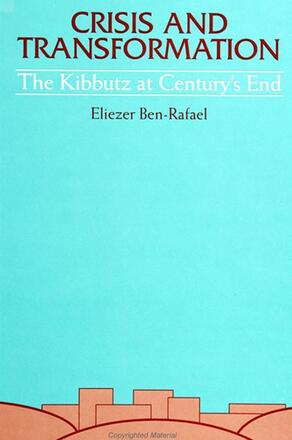
Crisis and Transformation
The Kibbutz at Century's End
Alternative formats available from:
Examines kibbutz life following the Israeli economic crisis of 1985, focusing on the kibbutz's dramatic transformation from a well-defined social structure to a collective identified principally by its cultural preoccupations.
Description
This book examines kibbutz life following the Israeli economic crisis of 1985, focusing on the kibbutz's dramatic transformation from a well-defined social structure to a collective identified principally by its cultural preoccupations. It centers on the contradictions endemic to kibbutz identity. Ben-Rafael shows how the crisis brought together a general pro-change Zeitgeist with the interests of the kibbutz's stronger social segments and individuals to produce widespread changes and the fragmentation of kibbutz reality as a whole. The book's findings are based on a large-scale research investigation (1991-1994) headed up by Ben-Rafael that included twenty research studies and involved the participation of researchers from diverse social-science disciplines. The book also provides a statistical abstract and a comprehensive kibbutz bibliography.
Eliezer Ben-Rafael is Professor of Sociology and Anthropology at Tel-Aviv University. He is the author or co-author of eleven other books, the most recent of which is Language, Identity, and Social Division: The Case of Israel, and is National Chairperson of the Israel Sociological Society.
Reviews
"In the field of kibbutz studies, this will be the most important book of the decade. Anyone with a general interest in Israel is likely to be interested in reading this book as well. The family, gender, education, economy, and polity are handled with a remarkable degree of competence and thoroughness. There are few scholars who could handle so much diverse material as well. " -- Raymond Russell,University of California, Riverside
"An important contribution to the study of the kibbutz. The topic is significant and important for several fields of study, such as the study of Israel, the study of communal and alternative societies and organizations, and the study of postmodernism. " -- Menachem Rosner, Institute for Research on the Kibbutz and the Cooperative Idea, University of Haifa
"This book is excellent in all areas--philosophy, theory, data, contemporary issues, and analytical insights. The high intellectual tone and the specific topic, I believe, make the book most interesting and unique. " -- Efraim Ben-Zadok, Florida Atlantic University